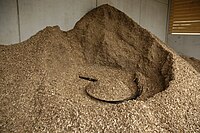Biomass heating system

Okay, so imagine you have a big house and it gets really cold in the winter. To warm up your house, you need something that can create warmth. One thing that can do that is a biomass heating system.
Now, biomass is a fancy word for things like wood, crops, and even garbage. Yes, garbage! These things can be turned into fuel, kind of like how gasoline powers a car. In a biomass heating system, the fuel is burned to make heat. This heat can then be used to warm up your house.
So, how does this work? Well, first you need to get the fuel. Let's say you have a bunch of wood logs. These would need to be cut into smaller pieces, like little sticks. Then, they would be placed into a special machine called a boiler.
The boiler is kind of like a big pot that boils water. But instead of using gas or electricity to heat the water, it uses the heat from the burning wood. The hot water then travels through pipes to the radiators in your house. These radiators are like big flat panels that get really hot. The heat from the water warms up the air in your house, making it all nice and toasty.
So, why would someone want to use a biomass heating system? Well, for one thing, it's a renewable energy source. That means it comes from things that can grow back or be replaced, like trees. Fossil fuels, like gas and oil, are not renewable and can run out.
Also, biomass is usually locally sourced. That means you don't have to rely on far-away countries to supply you with fuel. It can also be a lot cheaper than other heating methods, especially if you have access to free or cheap biomass, like scrap wood or leftover crops.
Plus, burning biomass can be a lot better for the environment than burning fossil fuels. While burning anything will release some pollutants, biomass is often seen as a cleaner option.
So, in summary, a biomass heating system is a way to heat up your house by burning things like wood or crops. The heat is created in a boiler, and then travels through pipes to radiators in your home. It's a renewable, locally sourced, and potentially cheaper and cleaner heating option.
Now, biomass is a fancy word for things like wood, crops, and even garbage. Yes, garbage! These things can be turned into fuel, kind of like how gasoline powers a car. In a biomass heating system, the fuel is burned to make heat. This heat can then be used to warm up your house.
So, how does this work? Well, first you need to get the fuel. Let's say you have a bunch of wood logs. These would need to be cut into smaller pieces, like little sticks. Then, they would be placed into a special machine called a boiler.
The boiler is kind of like a big pot that boils water. But instead of using gas or electricity to heat the water, it uses the heat from the burning wood. The hot water then travels through pipes to the radiators in your house. These radiators are like big flat panels that get really hot. The heat from the water warms up the air in your house, making it all nice and toasty.
So, why would someone want to use a biomass heating system? Well, for one thing, it's a renewable energy source. That means it comes from things that can grow back or be replaced, like trees. Fossil fuels, like gas and oil, are not renewable and can run out.
Also, biomass is usually locally sourced. That means you don't have to rely on far-away countries to supply you with fuel. It can also be a lot cheaper than other heating methods, especially if you have access to free or cheap biomass, like scrap wood or leftover crops.
Plus, burning biomass can be a lot better for the environment than burning fossil fuels. While burning anything will release some pollutants, biomass is often seen as a cleaner option.
So, in summary, a biomass heating system is a way to heat up your house by burning things like wood or crops. The heat is created in a boiler, and then travels through pipes to radiators in your home. It's a renewable, locally sourced, and potentially cheaper and cleaner heating option.
Related topics others have asked about:
